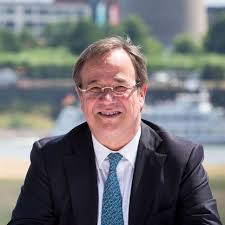Pragmatic governor Laschet elected to lead Merkel's party
Chancellor Angela Merkels center-right party on Saturday chose Armin Laschet, the pragmatic governor of Germanys most populous state, as its new leader sending a signal of continuity months before an election in which voters will decide who becomes the new chancellor.Laschet defeated Friedrich Merz, a conservative and one-time Merkel rival, at an online convention of the Christian Democratic Union.

- Country:
- Germany
Chancellor Angela Merkel’s center-right party on Saturday chose Armin Laschet, the pragmatic governor of Germany’s most populous state, as its new leader — sending a signal of continuity months before an election in which voters will decide who becomes the new chancellor.
Laschet defeated Friedrich Merz, a conservative and one-time Merkel rival, at an online convention of the Christian Democratic Union. Laschet won 521 votes to Merz’s 466; a third candidate, prominent lawmaker Norbert Roettgen, was eliminated in a first round of voting.
Saturday’s vote isn’t the final word on who will run as the center-right candidate for chancellor in Germany’s Sept. 26 election, but Laschet will either run for chancellor or will have a big say in who does.
Merkel, who has been chancellor since 2005, announced in late 2018 that she wouldn’t seek a fifth term. She also stepped down from the CDU leadership.
The decision ends an 11-month leadership limbo in Germany's strongest party after outgoing leader Annegret Kramp-Karrenbauer, who had failed to impose her authority on the party, announced her resignation. A vote on her successor was delayed twice because of the coronavirus pandemic.
There had been no clear favorite going into Saturday's convention, but the election of Merz would have marked at least a symbolic break with the Merkel era. Laschet will now have to work to strengthen party unity — something Kramp-Karrenbauer struggled with.
Laschet, 59, was elected in 2017 as governor of North Rhine-Westphalia state, a traditionally center-left stronghold. He governs the region in a coalition with the pro-business Free Democrats, the CDU's traditional ally on the right, but would likely be able to work smoothly with a more liberal partner, too.
Laschet pointed Saturday to the value of continuity and moderation.
“We must speak clearly but not polarize,” he told delegates. “We must be able to integrate, hold society together.'' He said that “we will only win if we remain strong in the middle of society.” Laschet said that “there are many people who find Angela Merkel good and only after that the CDU. He added that ”we need this trust now as a party'' and that “we must work for this trust.” Saturday's result will now be officially endorsed in a postal ballot — which is expected to be a formality but is required by German law.
The CDU is part of the Union bloc along with the Bavaria-only Christian Social Union, and the two parties will decide together on the center-right candidate for chancellor. The Union currently has a healthy poll lead, helped by positive reviews of Merkel's handling of the pandemic.
CSU leader Markus Soeder, the governor of Bavaria, is widely considered a potential candidate after gaining in political stature during the pandemic. Some also consider Health Minister Jens Spahn, who supported Laschet and was running to be his deputy, a possible contender.
(This story has not been edited by Devdiscourse staff and is auto-generated from a syndicated feed.)
ALSO READ
Union Health Secretary launches myCGHS app for iOS ecosystem of devices, designed for CGHS beneficiaries
CPI MP writes Union Education Minister to reinstate single girl child reservation in KVs
Mercedes-Benz rejects 'anti-union' allegations after US union complaints
Rahul Gandhi ashamed of IUML support, hence its flags absent in roadshow:Union Minister Irani
We will touch 35-seat target given by Union Home Minister Amit Shah in West Bengal: BJP's Sukanta Majumdar










